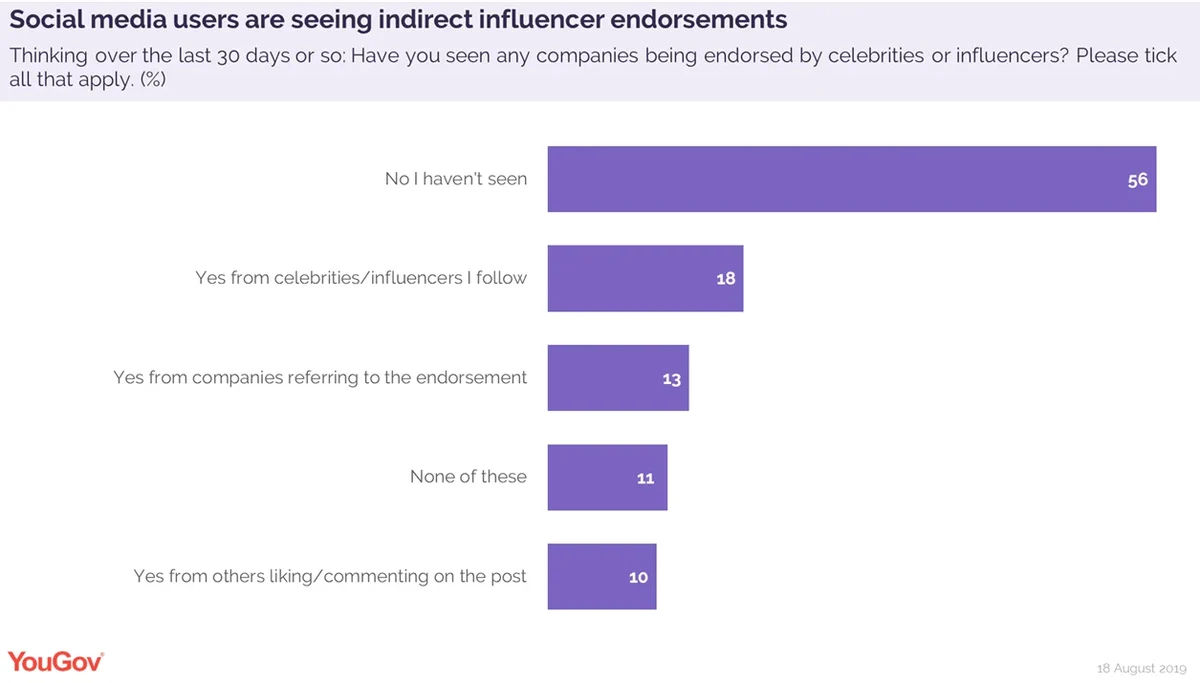Most social media users don’t trust influencer endorsements – but most engage with them regardless
Brits on social media have major trust issues: two-thirds (66%) believe that people’s lives as shown online “aren’t as perfect as they seem.”
But if they’re sceptical of people on the whole, they can be especially dubious when it comes to influencers. New research from YouGov reveals that only 22% believe that social media celebrities portray their lives honestly – and just 2% believe they portray their lives in a “very honest” way.
So how much does this honesty actually matter?
Brits aren’t under the influence
A plurality (44%) of Brits say that influencers generally portray their lives dishonestly – and more tellingly, over half (54%) of those who’ve seen dishonest content from them think it’s important for this group to be honest. Just under a quarter (24%) believes authenticity isn’t particularly important for online personalities.
In fact, Brits expect more from influencers than they do from their friends and family: only 38% believe it’s vital that the people they know are authentic on social media. There may be good reason for this. If Cousin Keith uses a sierra filter to make his holiday photos look a bit better, nobody’s really harmed by it; when influencers misrepresent their lives, they can potentially mislead large, young, and impressionable audiences.
Social media users don’t trust influencer endorsements…
These impressionable audiences can often be highly valuable for influencers, who can earn money through lucrative partnerships and endorsements.

When asked, 56% of Brits say they haven’t seen posts from celebrities/influencers that explicitly plug a company’s products of services over the past 30 days – but 18% say they’ve seen these posts from the people they’re following, 13% say they’ve seen these posts via companies referring to these posts, and 10% say they’ve seen them through others liking or commenting on them.
Almost half (49%) of those who’ve seen endorsements from people they follow agree that they’re not a genuine representation of the person promoting the product, and 46% think that endorsements aren’t believable at all. Only 13% and 16% consider them respectively genuine and believable, with the rest saying they “don’t know”.
…but they pay attention to them anyway
Clearly, there’s a real strain of scepticism at work here. But it doesn’t necessarily mean that endorsements are useless. For one thing, the same percentage of Brits who don’t find endorsements believable also distrust TV ads (46%). Consumers who insist that ads don’t work on them might still find that, when it comes down to it, they buy a brand they know from a commercial over a brand they don’t know at all. We can apply the same logic to influencer promotions: if most Brits don’t trust them, only a quarter (24%) of Brits who’ve been exposed to this kind of advertisement completely ignore it.
Brits might not always like internet personalities; they might not trust their motives; they might, in some cases, consider them outright dishonest. But they’re still paying attention – and attention, positive or otherwise, can be a valuable currency for influencers and the brands who work with them.
Photo: Getty
Download the whitepaper here





